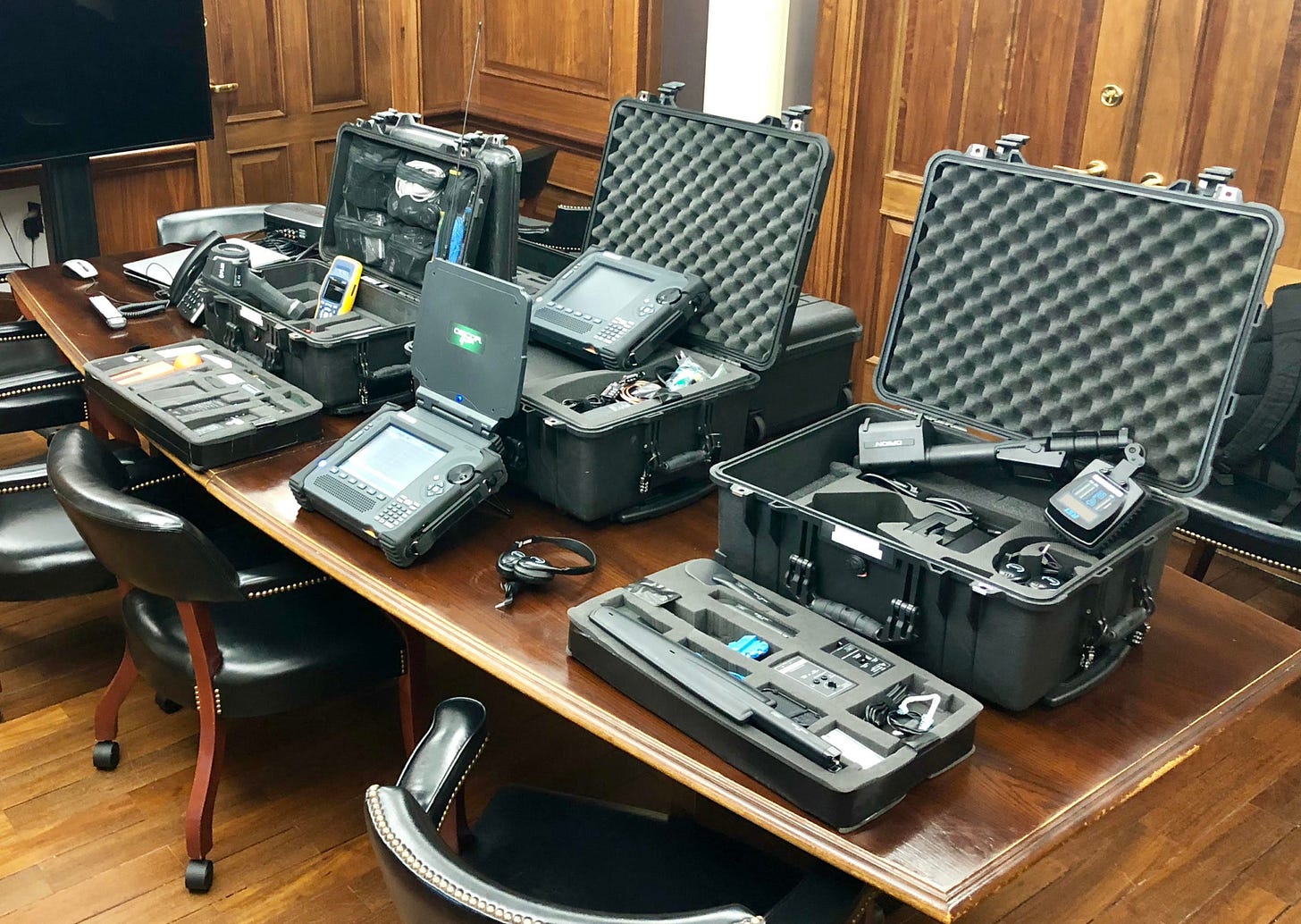Intelligence for Hire
Overview of the Privatised, Specialised and Fragmented World of Intelligence Contracting
Bottom Line Up Front (BLUF)
The global intelligence landscape has fundamentally transformed from state-controlled monopolies to a fragmented, market-driven ecosystem. 70% of US national intelligence budget now goes to contracting work, representing one of the most significant structural changes in modern intelligence operations. Two Key Patterns emerge:
Privatization: Systematic transfer of core intelligence functions (incl. SIGINT, HUMINT analysis) to private entities, accelerating post-9/11. Private contractors now handle 25% of NSA's cybersecurity operations and 40% of CIA's OSINT analysis.
Balkanization: Intelligence capabilities fragmented across numerous independent entities. Five major corporations (Booz Allen Hamilton, Leidos, CACI, SAIC, Palantir) employ 80% of private-sector intelligence personnel, with 150+ firms operating globally in a $120+ billion market.
Operational Benefits:
Cost Efficiency: Private R&D budgets outpace government 3:1 in AI/cyber domains
Specialized Expertise: Market hyperspecialization enables focused niche capabilities
Responsiveness: Companies like Sibylline provided Ukraine invasion intelligence 31 days pre-conflict, outperforming state agencies
Plausible Deniability: Operational distance from sensitive activities through jurisdictional fire walling
Critical Vulnerabilities:
Insider Threats: 30% of intelligence breaches now involve contractors, creating accountability vacuums
Silos: Fragmentation between Tier 1 firms dominating government contracts and boutique players excelling in specialised tasks creates intelligence stovepipes and oversight complications




Tier 1: Government Intelligence Contractors (Revenue >$1B)
Private intelligence contractors generating over $1B annually represent a critical extension of national security and corporate intelligence capabilities. These entities, usually Delaware incorporated and Virginia HQ, provide specialised expertise, scalable infrastructure, and advanced technologies often surpassing in-house government or corporate resources. Their deep integration into intelligence workflows creates significant dependencies and shapes the global intelligence landscape. These firms are foundational to US and allied government intelligence operations, holding massive, long-term contracts across the Intelligence Community (IC) and Department of Defense (DoD). The “Beltway Bandits” are entrenched near D.C. with revolving-door relationships with government officials and include:
Booz Allen Hamilton Holding Corporation (NYSE: BAH):
Market Position: Dominant IC partner, estimated to hold ~25% of US IC contracting dollars.
Capabilities: Full-spectrum intelligence support: signals intelligence (SIGINT) analytics, advanced cyber operations (offensive/defensive), mission operations support, data fusion, and strategic consulting. Key contributor to classified programs.
Scale: >30,000 employees, primarily cleared personnel. Revenue ~$9.5B. Majority-owned by The Carlyle Group.
Significance: Deep, institutional relationships with IC agencies; operates at the core of sensitive mission sets.
Leidos Holdings, Inc. (NYSE: LDOS):
Market Position: Largest pure-play government tech/intel contractor by revenue (~$15.4B). Major DoD/IC prime.
Capabilities: Technical surveillance systems, geospatial intelligence (GEOINT) processing (satellite, aerial), unmanned systems (UAS) integration, mission IT infrastructure, cybersecurity, biometrics, and large-scale systems engineering.
Scale: ~43,000 employees. Key provider of integrated mission solutions.
Significance: Critical infrastructure provider; enables collection, processing, and dissemination capabilities across domains.
CACI International Inc. (NYSE: CACI):
Market Position: Major provider of technical intelligence solutions (~$7.4B revenue).
Capabilities: Specializes in counterterrorism database management, multi-source intelligence fusion, cybersecurity, signals exploitation, biometric identification systems, and battlefield C4ISR.
Significance: Integral to counterterrorism and identity intelligence missions; provides specialized tools for data-driven targeting and analysis.
Science Applications International Corporation (SAIC) (NYSE: SAIC):
Market Position: Large-scale provider of technical and analytic services (~$7.4B revenue).
Capabilities: Systems engineering & integration, IT modernization, data analytics, cloud migration, cybersecurity, and mission support services across defense and intelligence domains.
Significance: Key enabler of core IT infrastructure and backend analytic capabilities supporting intelligence workflows.
In addition to these incumbents, we must assert that cyber, big data analytics and emerging technology has forever shifted the landscape and we must update our list to reflect this fact:
Palantir Technologies Inc. (NYSE: PLTR):
Market Position: Premier big data analytics and AI-driven intelligence platform provider (~$2.2B revenue). Significant niche player despite smaller size/headcount (~3,800 employees).
Capabilities: Flagship platforms: "Gotham" (government defense/intel - e.g., validated battlefield intelligence fusion, predictive logistics), "Foundry" (commercial/government digital transformation). Core competency: integrating disparate data sources for real-time decision advantage.
Significance: Proven operational impact (e.g., high-accuracy predictive analysis surpassing traditional assessments). Represents the shift towards AI/ML-driven intelligence. Early backing by In-Q-Tel underscores deep IC ties.
Verint Systems Inc. (~$1.3B)
Stock: NASDAQ: VRNT | Incorporated: Delaware, USA | HQ: Melville, NY
Surveillance and intelligence software
Approximately 5,000 employees
CrowdStrike Holdings, Inc. (~$3.6B)
Stock: NASDAQ: CRWD | Incorporated: Delaware, USA | HQ: Austin, TX
Cybersecurity and threat intelligence
General Dynamics Information Technology (GDIT) (~$9B parent, IT division ~$3B)
Stock: NYSE: GD | Incorporated: Delaware, USA | HQ: Falls Church, VA
Intelligence systems, cyber operations, mission support
ManTech International Corporation (~$2.5B)
Private (acquired by Carlyle 2022) | Was NYSE: MANT | HQ: Herndon, VA
Intelligence solutions, cyber security, mission support
L3Harris Technologies Inc (Intelligence division ~$2B of $18B total)
Stock: NYSE: LHX | Incorporated: Delaware, USA | HQ: Melbourne, FL
Intelligence, surveillance, reconnaissance systems
ICF International Inc (~$1.8B)
Stock: NASDAQ: ICFI | Incorporated: Delaware, USA | HQ: Fairfax, VA
Digital modernization, cybersecurity, intelligence analytics
Additionally, we must not underestimate the intelligence value of the Big Four Consulting firms (as well as Accenture, Mckinsey) including CIS, forensic accounting & eDiscovery, financial intelligence, AML, KYC, geopolitical risk assessment, due diligence, and integrity monitoring. Estimated intelligence-related revenue streams:
Deloitte: $2-3B (of ~$67B total)
PwC: $1-2B (of ~$55B total)
EY: $1-2B (of ~$49B total)
KPMG: $800M-1.5B (of ~$38B total)
Tier 2: Specialized Firms ($100M–$1B)
Firms generating $100M–$1B annually occupy critical niches in the intelligence ecosystem, offering specialized services that complement Tier 1 capabilities. These entities excel in high-risk environments, complex investigations, and domain-specific threat analysis, often operating in contexts where larger contractors lack granular expertise. In contrast to TIER 1, these firms are usually outperform larger contractors in high-context domains (e.g., Oxford Analytica’s academic networks, Flashpoint’s dark web access, Control Risks and Stratfor’s early-warning capabilities). Tier 2 contractors serve as force multipliers for state and commercial clients, delivering granular intelligence in politically volatile or technologically complex environments where agility and subject-matter specialization compensate for budgetary constraints.
Corporate Intelligence & Risk Consulting
Specializing in geopolitical risk, corporate investigations, and crisis management, these firms navigate complex transnational challenges.
FTI Consulting, Inc. (NYSE: FCN)
Market Position: ~$400–500M intelligence division within $3.7B parent company.
Capabilities: Cyber intelligence, digital forensics, and regulatory compliance. Maintains strategic alliances (e.g., BigID for AI-driven data governance) enhancing risk management frameworks 1012.
Scale: 250+ specialists; intelligence unit built via acquisitions (e.g., Global Risk Advisors, 2007).
Significance: Key provider for anti-bribery and financial crime compliance, supporting Fortune 500 clients in enterprise-wide risk transformations.
Kroll LLC
Market Position: ~$700M–$1B revenue; Duff & Phelps subsidiary.
Capabilities: Asset recovery, blockchain forensics, and corporate investigations. Noted for recovering $2B in 1MDB scandal funds via Malaysian informant networks and tracing Saddam Hussein’s hidden assets.
Scale: 5,000 employees across 28+ countries; expanded cyber capabilities post-Secureworks acquisition (2015).
Significance: Primary partner for global law firms in cross-border fraud investigations.
Control Risks Group Holdings Ltd
Market Position: ~$400–500M revenue; UK-origin firm with 34 global offices.
Capabilities: Political risk mitigation, kidnap/ransom negotiation, and evacuation operations (e.g., Sudan 2023). FIFA corruption scandal investigative lead.
Scale: 3,000 employees; structured with jurisdictional subsidiaries.
Partnerships: Formal alliance with International SOS for integrated travel security solutions.
Oxford Analytica Ltd
Market Position: ~$150–200M revenue; academic-driven intelligence.
Capabilities: "Daily Brief" service for 50+ governments; G7 advisory contracts leveraging 1,500+ scholar network.
Scale: 200 full-time staff; Oxford HQ with DC/NY offices.
Differentiator: Proprietary models linking macroeconomic trends to political stability.
Stratfor Enterprises LLC (RANE Network)
Market Position: ~$100–150M revenue; acquired by RANE Holdings (2020).
Capabilities: Geopolitical forecasting via 100+ analysts; crisis monitoring centers tracking real-time global events.
Legacy: Founded by George Friedman (1996); pioneered subscription-based intelligence workflows.
Cybersecurity Intelligence
Focused on digital threats, dark web monitoring, and attack surface management.
Recorded Future, Inc.
Market Position: ~$200–300M revenue; Insight Partners subsidiary.
Capabilities: Real-time threat intelligence using AI-driven web scraping; predictive alerts for state-sponsored cyber campaigns.
Client Base: Government agencies and financial institutions.
Flashpoint Intelligence
Market Position: ~$100–200M revenue; NY-based dark web specialist.
Capabilities: Illicit forum monitoring; ransomware negotiation support.
Differentiator: Linguist teams analyzing underground communities in 12 languages.
RiskIQ, Inc.
Status: Acquired by Microsoft (2021) for ~$150M.
Legacy Capabilities: Digital footprint mapping; supply chain vulnerability assessment.
Integration: Technology now embedded in Microsoft Defender ecosystem.
Specialized Intelligence Services
Bridging government-grade expertise with corporate applications.
The Chertoff Group
Market Position: ~$100–150M revenue; DC-based security advisory.
Capabilities: Counterintelligence, CFIUS compliance, and critical infrastructure protection.
Leadership: Founded by former DHS Secretary Michael Chertoff.
SOS International LLC (SOSi)
Market Position: ~$400–500M revenue; military-linguist services provider.
Capabilities: Intelligence support to SOCOM; HUMINT operations in conflict zones.
Scale: 2,000+ linguists deployed globally.
Berkeley Research Group, LLC
Market Position: ~$200–300M revenue; forensic accounting leader.
Capabilities: "APEX" analytics platform (Palantir partnership); 1MDB investigation co-lead.
Structure: 1,200 professionals across 40 offices; cyber operations hub in Singapore 12.
Janes Information Services
Market Position: ~$200–300M revenue; S&P Global-owned OSINT pioneer.
Capabilities: Military equipment databases (90,000+ systems), orders of battle, and defense budget analysis 14.
Recent Expansion: Acquired RWR Advisory Group (2022) enhancing geopolitical risk offerings 14.
NSO Group Technologies Ltd (~$200-300M)
Private Company | Incorporated: Israel | HQ: Herzliya, Israel
Surveillance technology, Pegasus spyware
Pinkerton Consulting & Investigations Inc (~$200M PI division of $1.5B Securitas)
Private (owned by Securitas AB) | Incorporated: New Jersey, USA | HQ: Ann Arbor, MI
Private investigations and security consulting
Established in 1850 and is now a private company operating as a subsidiary of Securitas AB, a Swedish security companies

Tier 3: Boutique Firms (<$100M)
Firms under $100M revenue operate in the intelligence ecosystem’s dirty, dangerous, deniable work, focusing on white glove aND hyper-specialized expertise, and access to restricted environments or information. Their agility and low profile make them preferred partners for specialized where larger contractors cannot operate effectively due to compliance, PR, and operational constraints. Higher tier firms will distance themselves from sensitive topics via multi-layered sub-contracting to boutique firms. These firms often ofter paid access to networks such as regional players, government liaisons or specialised fixers as well as employ independent contractors who are willing to discretely employ controversial methods. While these firms remain lean to operate under minimal oversight that is not to say they all employ the same tactics, some merely sell access to their extensive professional network. However, these firms are at high risk of being consolidated by Tier 1/2 players.
Specialized Intelligence
Black Cube Intelligence Ltd
Market Position: $50–75M revenue; Israeli/UK dual-base structure.
Capabilities: Covert operations using elaborate covers (e.g., 23 agents deployed in Weinstein case), corporate espionage, and litigation support.
Network: ~100 employees + contractor pool; founded by ex-Unit 8200 officers. Mossad ex-director Meir Dagan served as honorary president.
Risk Profile: Faces ongoing legal scrutiny in multiple jurisdictions for deceptive practices.
Hakluyt & Company Ltd
Market Position: $30–50M revenue; MI6 alumni network.
Capabilities: Discreet intelligence for FTSE 100 clients (60% penetration); accesses non-traditional information channels.
Controversies: Monitored environmental activists for Shell (1990s); maintains deep UK establishment ties.
The Prince Group
Structure: Network including Total Intelligence Solutions (VA) and Frontier Services Group (HKEX: 0500).
Capabilities: High-risk region intelligence, counterterrorism advisory, and secure logistics. Led by Erik Prince (Blackwater) and ex-CIA counterterrorism head Joseph Cofer Black.
Geopolitical Ties: FSG backed by China’s CITIC Group; holds significant African/Asian contracts.
Due Diligence & Investigative Specialists
Diligence International Group
Market Position: $40–60M revenue; K Street/Washington DC nexus.
Capabilities: Infiltration operations (e.g., "Operation Yucca" against KPMG), sovereign risk analysis.
Leadership: Founded by ex-CIA officers; Chaired by William Webster (ex-FBI/CIA Director).
Structure: 5 global entities; $413M New Mountain Capital investment (2018).
Mintz Group Ltd
Market Position: $30–50M revenue; 17-office global footprint.
Capabilities: TRACE-MINT database (400M+ entities); 108 CFE-certified investigators.
Operational Risk: Beijing office raided by Chinese authorities (2023); operates through Delaware shell (ID: 7138221).
Nardello & Co. LLC
Market Position: $40–60M revenue; led by ex-federal prosecutors.
Significance: Key player in FIFA corruption probes; sovereign wealth fund advisor.
Forward Risk & Intelligence
Market Position: ~$75–100M revenue; AI-driven due diligence.
Tech: "Horizon" platform integrated with Refinitiv World-Check.
Structure: TS/SCI clearance via Forward Risk Federal Services LLC; strict "Chinese Wall" between political/corporate divisions.
Asset Tracing & Financial Forensics
Berkeley Research Group (BRG)
Capabilities: "APEX" analytics (Palantir-powered); 1MDB investigation co-lead.
Scale: 1,200 staff; Singapore cyber hub; Ducat Capital $230M investment (2017).
Forensic Risk Alliance (FRA)
Market Position: $20–30M revenue; Paris/Montreal data centers.
Tech: Proprietary "FUSION" transaction monitoring for EU regulators.
Notable Work: Airbus SE $4B FCPA settlement support.
Bishop Group
Structure: Swiss/Luxembourg entities (CHE-123.456.789).
Specialization: Offshore asset tracing; 30 certified financial investigators.
Regional & Technical Specialists
Blackpeak Group Ltd
Market Position: $10–20M revenue; Asia focus (Shanghai/Mumbai).
Tech: AI document processing via Singapore A*STAR partnership.
Acquisition: Bought by Acuris (2019, $33M).
Paragon Solutions Ltd
Market Position: $50–100M revenue; Israeli surveillance tech.
Government Ties: $2M ICE contract (2024); spyware developer.
Ergo Advisory Services
Tech: "CORE" relationship mapping (300M+ entities).
Network: 7,400 MENA sources; Arab Spring intelligence operations.
Structure: Shield Capital Partners-backed; NY DOS ID: 3133829.
Quest Research & Investigations
Capabilities: HUMINT operations; TS/SCI clearance via QRI Federal Services.
Leadership: Ex-CIA officers; 175 personnel across McLean/London/Singapore.


Conclusion
The private intelligence market has evolved into a stratified, interdependent ecosystem of fiefdoms that have become critical to national security and corporate governance. Tier 1-3 contractors collectively enable capabilities exceeding most state resources, but create systemic vulnerabilities through market consolidation, legal ambiguities, and reliance on non-state for-profit actors for core intelligence functions. While tier 1 offer foundational infrastructure, tier 2 deliver niche superiority and tier 3 provide personalised and deniable white glove expertise while operating in a non-scaleable gray-zone of business practises relying on personal connections and savoir-faire. This tiered structure, which relies heavily on sub-contracting (Deleware LLC), multi-Jurisdictional subsidiaries (Hong Kong, Switzerland, Caribbean), and jurisdictional offshoring, leverages the corporate veil as an operational security measure providing a legal fire-wall between clients and sources and methods. For additional security, clients will employ an intermediary proxy, usually a white-shoe law firm (protected under attorney client privilege) to contact and interact with the appropriate parties at their discretion to resolve the client needs (e.g. diligence, assets recovery, threat assessments, etc). This corporate compartmentalisation ensures clean hands. Such intermediaries have been intentionally left out of this report.
End of Brief.






